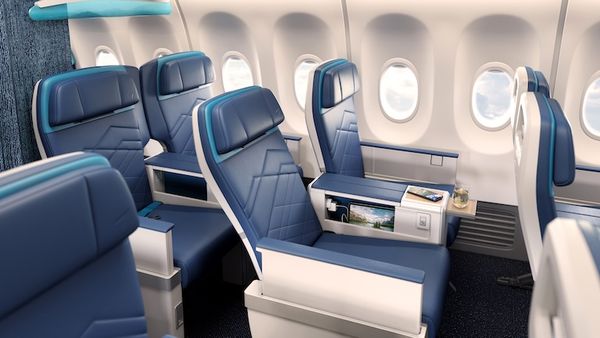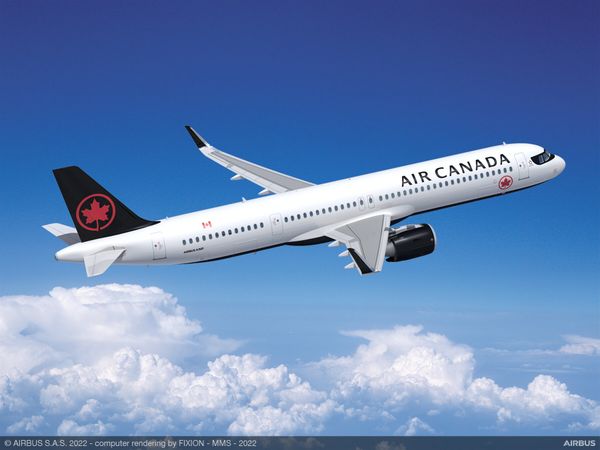An example of the intersection between film and aviation involves the 2020 film Tenet. The movie's directors purchased a Boeing 747 to blow up during filming.

Explanation
Famed director Christopher Nolan has always been known to prefer practical effects over CGI. However, Nolan took this preference to the maximum during the production of the 2020 action film Tenet. One of the main sequences in the movie involves an aircraft crashing into a building and exploding. Many directors would implement computer-generated imagery (CGI) to illustrate such a dramatic scene.
However, Nolan decided to purchase a Boeing 747 for the film. This plane would be blown up to complete the specific scene in the movie. Nolan and the Tenet production team purchased an aircraft instead of CGI since buying a physical 747 was more economical than other methods.
Nolan said about his choice to Total Film Magazine:
“I planned to do it [blowing up the plane for the scene] using miniatures and set-piece builds and a combination of visual effects and all the rest. However, while scouting for locations in Victorville, California, the team discovered a massive array of old planes. We started to run the numbers...It became apparent that it would actually be more efficient to buy a real plane of the real size, and perform this sequence for real in camera, rather than build miniatures or go the CGI route.”

Deciding to buy the retired 747 was a good choice for Nolan, and, as he says, blowing it up for the sake of the film was "a very exciting thing to be a part of." The film was released on August 26, 2020, in the United Kingdom and September 3, 2020, in the United States, amassing over $365 million at the box office.
The Aircraft
When Nolan referred to his production team discovering a "massive array of old planes" when scouting for filming locations in Victorville, he was referring to none other than the Southern California Logistics Airport (VCV) located near the city. Victorville Airport is in a desert, with the dry climate making it a desirable location for storing retired or decommissioned aircraft. Other notable aircraft graveyards, such as Roswell, New Mexico (ROW) and Alice Springs, Australia (ASP), are also in desert environments.
Victorville Airport is home to ComAv Technical Services, an aircraft maintenance and storage company that operates a 240-acre (97-hectare) open storage facility. Over 500 aircraft can be stored in Victorville. Various aircraft from airlines worldwide and the U.S. Air Force can be seen sitting dormant in the desert airfield.

The Boeing 747 used in Tenet was a former Cathay Pacific Cargo Boeing 747-200F registered B-HMD. This aircraft was built in 1981 as a Boeing 747-200M. The "M" designates that this was a 747 "Combi" or a combination between a passenger and cargo aircraft. It had a small cargo section towards the rear of the plane. The 747 flew passengers for Brazilian carrier Varig and Aerolíneas Argentinas before being converted in 1996 for freighter use by Air Hong Kong.
Air Hong Kong's 747 freighters were later transferred to parent company Cathay Pacific Cargo. Cathay operated the aircraft until it was sent to Victorville for retirement in 2009. B-HMD had been stored in Victorville for over a decade when the Tenet crew picked it up.
Still retaining its original Cathay chrome fuselage, the plane was painted in the fictional livery of "Norskfreight" for usage in the film. It was re-registered to LN-WTJK, with "LN" being the registration prefix for aircraft registered in Norway. LN-WTJK was purposefully crashed into a hangar building and blown up during the filming process.
Tenet stands out from other films since using commercial aircraft to produce films is relatively uncommon, with teams purchasing an entire plane to create an explosion even rarer. Passengers who decide to watch Tenet now know how the Boeing 747 scene was put together in the filming process.
Beijing's Boeing: What It's Like Onboard China's COMAC C919 » EgyptAir Looks to Add Chicago, Los Angeles Flights in 2026 » From Drones to Jumbo Jets: Why Learning About Aviation is More Accessible Than Ever »
Comments (0)
Add Your Comment
SHARE
TAGS
INFORMATIONAL Tenet Boeing 747 Boeing Cathay Pacific FilmRECENTLY PUBLISHED
 WestJet Introduces New Cabin Interiors for 737 Fleet
WestJet has announced a new interior overhaul on its Boeing 737 aircraft, offering customers additional comfort, a higher-end design, and faster Wi-Fi. The company states the retrofit project will be completed by late 2025.
NEWS
READ MORE »
WestJet Introduces New Cabin Interiors for 737 Fleet
WestJet has announced a new interior overhaul on its Boeing 737 aircraft, offering customers additional comfort, a higher-end design, and faster Wi-Fi. The company states the retrofit project will be completed by late 2025.
NEWS
READ MORE »
 From Drones to Jumbo Jets: Why Learning About Aviation is More Accessible Than Ever
Discover how aviation knowledge, from drones to jumbo jets, is becoming more accessible to students and enthusiasts through modern tools and global opportunities.
INFORMATIONAL
READ MORE »
From Drones to Jumbo Jets: Why Learning About Aviation is More Accessible Than Ever
Discover how aviation knowledge, from drones to jumbo jets, is becoming more accessible to students and enthusiasts through modern tools and global opportunities.
INFORMATIONAL
READ MORE »
 Air Canada Expands Network Amid First A321XLR Arrival
Air Canada’s intercontinental map is about to undergo a massive overhaul; the carrier is set to receive the first of 30 Airbus A321XLR(extra-long range) aircraft, set to arrive in the first quarter of 2026. Up to ten additional A321XLRs will join the airline's fleet by the end of 2026.
NEWS
READ MORE »
Air Canada Expands Network Amid First A321XLR Arrival
Air Canada’s intercontinental map is about to undergo a massive overhaul; the carrier is set to receive the first of 30 Airbus A321XLR(extra-long range) aircraft, set to arrive in the first quarter of 2026. Up to ten additional A321XLRs will join the airline's fleet by the end of 2026.
NEWS
READ MORE »



